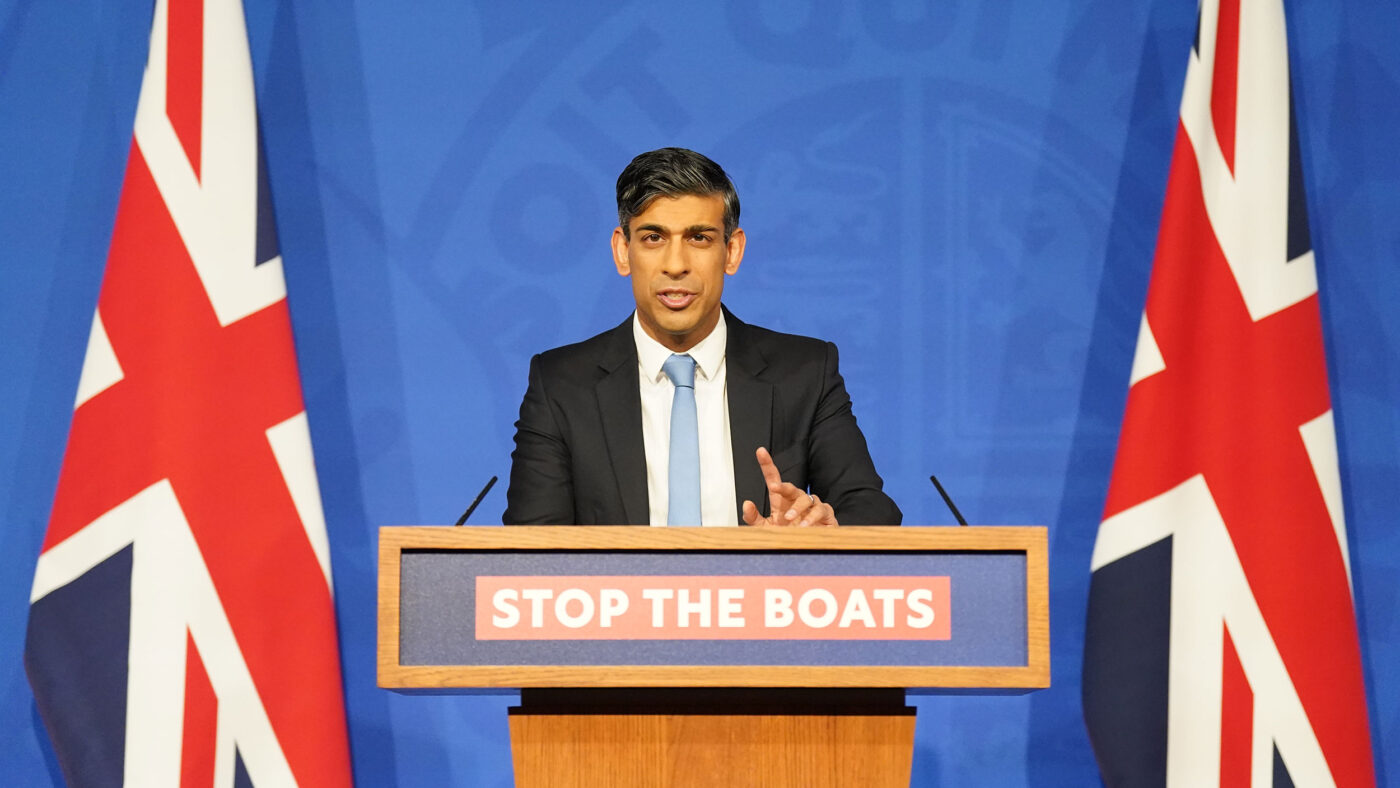Why do I bother? It’s a question I imagine that Rishi Sunak asks himself most days, but today more than most. After much huffing and puffing from the backbenches, only 11 Tory MPs voted against the Prime Minister’s Safety of Rwanda (Asylum and Immigration) Bill last night, as it passed the Commons by 320 votes to 276. Sunak’s strategy for tackling the small boats crisis remains alive and heading for the House of Lords.
He would have had little time to celebrate. Today’s Times has a YouGov poll showing the Tories on their lowest level of support since Liz Truss was Prime Minister. The Conservatives could only command 20% of the vote, 27 points adrift from Labour. What’s more, only 35% of their 2019 voters were said to trust Sunak on migration, compared to 54% backing Nigel Farage.
Coming so soon after the same pollster’s MRP model showing the Tories heading for a 1997-style landslide defeat, and Sunak could hardly be faulted for wondering if all the time, effort, and money he has put into getting a flight to Rwanda across the line has been in vain. He would be right to do so. The Rwanda scheme is a chimera that won’t ‘Stop the Boats’ or revive Conservative fortunes.
That’s if it even makes it onto the statute book. The House of Lords are unlikely to block it outright. But this is the last session of this Parliament, so Sunak would be unable to use the Parliament Act to force it through if they did. The Conservatives do not have a majority in the upper House. The policy wasn’t in the 2019 Tory manifesto, so they can’t rely on the Salisbury/Addison Convention.
Expecting the imminent arrival of a Labour government that would cancel the Rwanda policy even if it was up and running, peers could reject the Bill or kill it by adding amendments they know MPs would not accept. Sunak could then blame the Lords for his inability to stop this summer’s crossings. But that would only further reinforce the growing consensus amongst voters that he is weak and ineffective.
Even if the Lords did not try to stymie the Bill’s passage, the question remains open as to whether it could overcome the legal resistance that has hitherto kept flights to Rwanda grounded. My colleague Henry Hill thinks it might. But there is no way of knowing until it reaches the courts. Cunning legal challenges have so far been effective in preventing a single migrant from ever reaching Kigali.
With ministers unlikely to take the Henry VI option and ‘kill all the lawyers’, Suella Braverman, Robert Jenrick, and co were probably right to say the Bill needed strengthening. But since 50 of the 61 of those who rebelled on Jenrick’s effort to stop so-called ‘pyjama injunctions’ folded to back the unamended Bill as is, the rebels will only have the future comfort of saying ‘I told you so’ to their more tremulous colleagues. Yet if the policy does prove ineffective, the Conservatives have now taken ownership of it – their credibility with the electorate will be even more shot than it already is.
Reports suggest Sunak has always had his doubts about the scheme. It was an unhappy inheritance from Boris Johnson and Priti Patel, as much a distraction from Partygate as a serious policy. For its part, the Rwandan government once suggested it could only accommodate 200 or so asylum seekers a year (though subsequently both parties have clarified the number is uncapped). A total of 29,437 people crossed the channel last year. No wonder that some potential migrants currently waiting to cross from Calais are utterly unfazed. They know their chance of ever ending up in Kigali is zero.
The best argument in favour of the Rwanda policy is that there is no viable alternative on offer. Labour’s approach would amount to surrender. Similar schemes are being investigated by governments across Europe. But with time running out ahead of an election, this is starting to look like a last throw of the dice. Whatever his own doubts, Sunak is pursuing the Rwanda scheme merely to show voters that he is doing something.
They are unlikely to be impressed. Polling for Onward this week showed that nine out of ten UK parliamentary constituencies want to see immigration reduced. Another survey found 47% of voters backed the policy. But only a quarter thought it would reduce numbers, and more than half thought it would make no difference. Their pessimism is born of experience.
Even a functioning Rwanda policy couldn’t compensate for the fact that net migration to June 2023 hit 672,000. ‘Stopping the boats’ will be a drop in the ocean as long as our Treasury-brained economy remains addicted to a continual hit of cheap foreign labour. Even if the Rwanda policy survives the courts, voters know the Tory record on controlling our borders is laughable.
Managing unprecedented flows of migration will be a crucial challenge of the 21st century. For all its flaws, the Rwanda scheme at least opens conversations on the vast changes in policy, approach, and law that will be required to ensure that borders do not become a thing of history. A sensible start would be to accept Rwanda’s kind offer of our money back, and a return to the drawing board.
Click here to subscribe to our daily briefing – the best pieces from CapX and across the web.
CapX depends on the generosity of its readers. If you value what we do, please consider making a donation.


